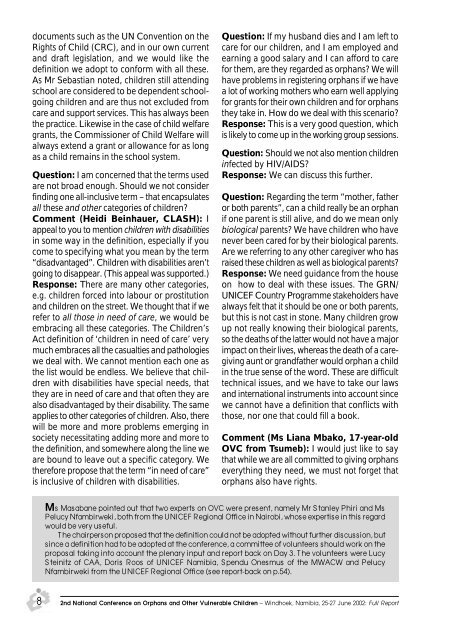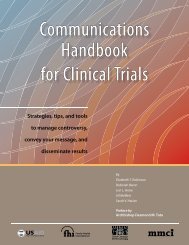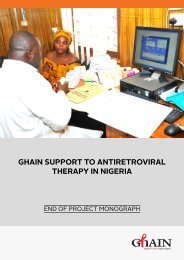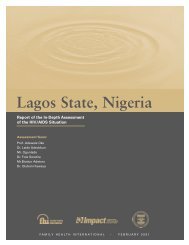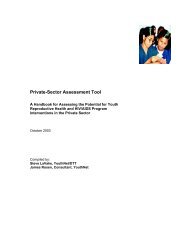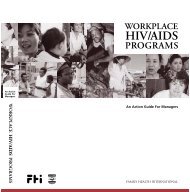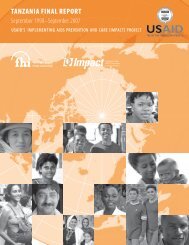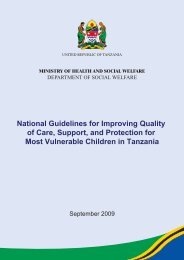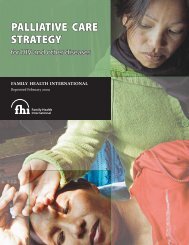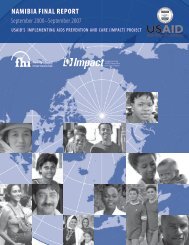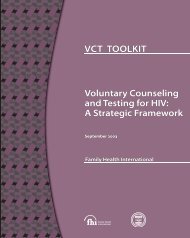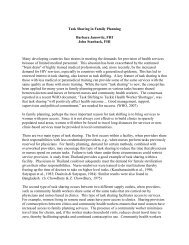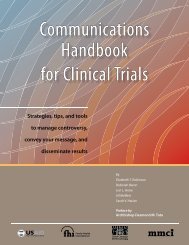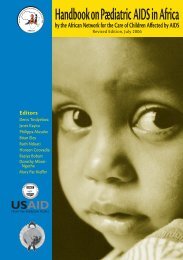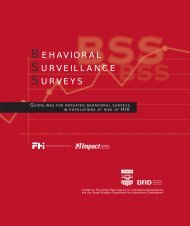2nd National Conference on Orphans and Other ... - FHI 360
2nd National Conference on Orphans and Other ... - FHI 360
2nd National Conference on Orphans and Other ... - FHI 360
You also want an ePaper? Increase the reach of your titles
YUMPU automatically turns print PDFs into web optimized ePapers that Google loves.
documents such as the UN C<strong>on</strong>venti<strong>on</strong> <strong>on</strong> the<br />
Rights of Child (CRC), <strong>and</strong> in our own current<br />
<strong>and</strong> draft legislati<strong>on</strong>, <strong>and</strong> we would like the<br />
definiti<strong>on</strong> we adopt to c<strong>on</strong>form with all these.<br />
As Mr Sebastian noted, children still attending<br />
school are c<strong>on</strong>sidered to be dependent schoolgoing<br />
children <strong>and</strong> are thus not excluded from<br />
care <strong>and</strong> support services. This has always been<br />
the practice. Likewise in the case of child welfare<br />
grants, the Commissi<strong>on</strong>er of Child Welfare will<br />
always extend a grant or allowance for as l<strong>on</strong>g<br />
as a child remains in the school system.<br />
Questi<strong>on</strong>: I am c<strong>on</strong>cerned that the terms used<br />
are not broad enough. Should we not c<strong>on</strong>sider<br />
finding <strong>on</strong>e all-inclusive term – that encapsulates<br />
all these <strong>and</strong> other categories of children?<br />
Comment (Heidi Beinhauer, CLASH): I<br />
appeal to you to menti<strong>on</strong> children with disabilities<br />
in some way in the definiti<strong>on</strong>, especially if you<br />
come to specifying what you mean by the term<br />
“disadvantaged”. Children with disabilities aren’t<br />
going to disappear. (This appeal was supported.)<br />
Resp<strong>on</strong>se: There are many other categories,<br />
e.g. children forced into labour or prostituti<strong>on</strong><br />
<strong>and</strong> children <strong>on</strong> the street. We thought that if we<br />
refer to all those in need of care, we would be<br />
embracing all these categories. The Children’s<br />
Act definiti<strong>on</strong> of ‘children in need of care’ very<br />
much embraces all the casualties <strong>and</strong> pathologies<br />
we deal with. We cannot menti<strong>on</strong> each <strong>on</strong>e as<br />
the list would be endless. We believe that children<br />
with disabilities have special needs, that<br />
they are in need of care <strong>and</strong> that often they are<br />
also disadvantaged by their disability. The same<br />
applies to other categories of children. Also, there<br />
will be more <strong>and</strong> more problems emerging in<br />
society necessitating adding more <strong>and</strong> more to<br />
the definiti<strong>on</strong>, <strong>and</strong> somewhere al<strong>on</strong>g the line we<br />
are bound to leave out a specific category. We<br />
therefore propose that the term “in need of care”<br />
is inclusive of children with disabilities.<br />
Questi<strong>on</strong>: If my husb<strong>and</strong> dies <strong>and</strong> I am left to<br />
care for our children, <strong>and</strong> I am employed <strong>and</strong><br />
earning a good salary <strong>and</strong> I can afford to care<br />
for them, are they regarded as orphans? We will<br />
have problems in registering orphans if we have<br />
a lot of working mothers who earn well applying<br />
for grants for their own children <strong>and</strong> for orphans<br />
they take in. How do we deal with this scenario?<br />
Resp<strong>on</strong>se: This is a very good questi<strong>on</strong>, which<br />
is likely to come up in the working group sessi<strong>on</strong>s.<br />
Questi<strong>on</strong>: Should we not also menti<strong>on</strong> children<br />
infected by HIV/AIDS?<br />
Resp<strong>on</strong>se: We can discuss this further.<br />
Questi<strong>on</strong>: Regarding the term “mother, father<br />
or both parents”, can a child really be an orphan<br />
if <strong>on</strong>e parent is still alive, <strong>and</strong> do we mean <strong>on</strong>ly<br />
biological parents? We have children who have<br />
never been cared for by their biological parents.<br />
Are we referring to any other caregiver who has<br />
raised these children as well as biological parents?<br />
Resp<strong>on</strong>se: We need guidance from the house<br />
<strong>on</strong> how to deal with these issues. The GRN/<br />
UNICEF Country Programme stakeholders have<br />
always felt that it should be <strong>on</strong>e or both parents,<br />
but this is not cast in st<strong>on</strong>e. Many children grow<br />
up not really knowing their biological parents,<br />
so the deaths of the latter would not have a major<br />
impact <strong>on</strong> their lives, whereas the death of a caregiving<br />
aunt or gr<strong>and</strong>father would orphan a child<br />
in the true sense of the word. These are difficult<br />
technical issues, <strong>and</strong> we have to take our laws<br />
<strong>and</strong> internati<strong>on</strong>al instruments into account since<br />
we cannot have a definiti<strong>on</strong> that c<strong>on</strong>flicts with<br />
those, nor <strong>on</strong>e that could fill a book.<br />
Comment (Ms Liana Mbako, 17-year-old<br />
OVC from Tsumeb): I would just like to say<br />
that while we are all committed to giving orphans<br />
everything they need, we must not forget that<br />
orphans also have rights.<br />
Ms Masabane pointed out that two experts <strong>on</strong> OVC were present, namely Mr Stanley Phiri <strong>and</strong> Ms<br />
Pelucy Nfambirweki, both from the UNICEF Regi<strong>on</strong>al Office in Nairobi, whose expertise in this regard<br />
would be very useful.<br />
The chairpers<strong>on</strong> proposed that the definiti<strong>on</strong> could not be adopted without further discussi<strong>on</strong>, but<br />
since a definiti<strong>on</strong> had to be adopted at the c<strong>on</strong>ference, a committee of volunteers should work <strong>on</strong> the<br />
proposal taking into account the plenary input <strong>and</strong> report back <strong>on</strong> Day 3. The volunteers were Lucy<br />
Steinitz of CAA, Doris Roos of UNICEF Namibia, Spendu Onesmus of the MWACW <strong>and</strong> Pelucy<br />
Nfambirweki from the UNICEF Regi<strong>on</strong>al Office (see report-back <strong>on</strong> p.54).<br />
8 <str<strong>on</strong>g>2nd</str<strong>on</strong>g> <str<strong>on</strong>g>Nati<strong>on</strong>al</str<strong>on</strong>g> <str<strong>on</strong>g>C<strong>on</strong>ference</str<strong>on</strong>g> <strong>on</strong> <strong>Orphans</strong> <strong>and</strong> <strong>Other</strong> Vulnerable Children – Windhoek, Namibia, 25-27 June 2002: Full Report


